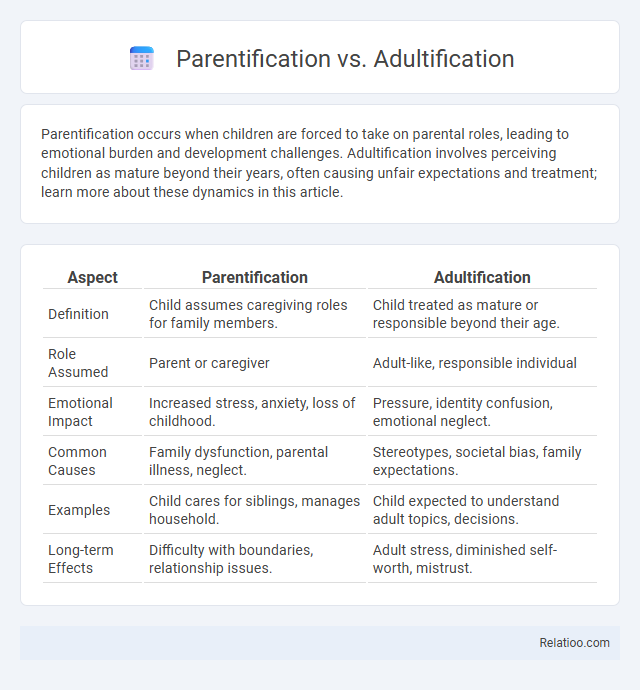Parentification occurs when children are forced to take on parental roles, leading to emotional burden and development challenges. Adultification involves perceiving children as mature beyond their years, often causing unfair expectations and treatment; learn more about these dynamics in this article.
Table of Comparison
| Aspect | Parentification | Adultification |
|---|---|---|
| Definition | Child assumes caregiving roles for family members. | Child treated as mature or responsible beyond their age. |
| Role Assumed | Parent or caregiver | Adult-like, responsible individual |
| Emotional Impact | Increased stress, anxiety, loss of childhood. | Pressure, identity confusion, emotional neglect. |
| Common Causes | Family dysfunction, parental illness, neglect. | Stereotypes, societal bias, family expectations. |
| Examples | Child cares for siblings, manages household. | Child expected to understand adult topics, decisions. |
| Long-term Effects | Difficulty with boundaries, relationship issues. | Adult stress, diminished self-worth, mistrust. |
Understanding Parentification: Definition and Key Characteristics
Parentification is a psychological process in which a child assumes adult responsibilities and roles within the family, often caring for siblings or emotionally supporting parents. Key characteristics include role reversal, emotional burden, and premature maturity, distinguishing it from adultification where children are perceived as more mature but may not take on caregiving duties. Understanding parentification involves recognizing its impact on emotional development and the potential for long-term psychological effects such as anxiety and difficulty in establishing boundaries.
What is Adultification? Distinguishing Features and Examples
Adultification refers to the process where a child is perceived or treated as more mature or responsible than their developmental stage warrants, often leading to inappropriate expectations of adult-like behavior. It differs from parentification, which involves a child assuming caregiving roles typically held by parents, by focusing on external perceptions and societal biases rather than familial role shifts. Examples include a child being unfairly blamed for family problems, expected to manage their own and sibling's emotional needs, or facing harsher disciplinary actions based on assumptions of maturity rather than age-related capacity.
Parentification vs Adultification: Core Differences
Parentification involves a child taking on caregiving roles typically assigned to parents, such as emotional support or household duties, often due to family dysfunction, whereas adultification refers to perceiving or treating a child as more mature or responsible than their age warrants, frequently leading to premature expectations. The core difference lies in parentification being a role reversal where the child acts as a caregiver, while adultification is an external perception or bias that imposes adult-like expectations on the child. Both phenomena can impact psychological development but differ in origin and experiential dynamics within family or social contexts.
Psychological Impacts of Parentification on Children
Parentification occurs when children assume adult responsibilities, often leading to increased stress, anxiety, and emotional burden that can hinder their psychological development. Unlike adultification, which attributes adult traits to children prematurely, parentification specifically involves children taking on caregiving roles, resulting in impaired boundaries and potential difficulties in forming healthy relationships later in life. The psychological impacts of parentification include heightened risk of depression, low self-esteem, and challenges in emotional regulation due to the disproportionate expectations placed on the child.
The Lasting Effects of Adultification in Childhood
Adultification occurs when children are prematurely burdened with adult responsibilities, often leading to emotional stress and identity confusion. Unlike parentification, which involves taking on caregiving roles for family members, adultification imposes unrealistic expectations on Your emotional development. This early pressure can result in lasting effects such as anxiety, difficulty setting boundaries, and challenges in forming healthy relationships later in life.
Cultural and Societal Influences on Parentification and Adultification
Cultural and societal influences significantly shape the experiences of parentification and adultification, often dictated by community values, family structures, and socioeconomic factors. In collectivist cultures, parentification may be normalized as children take on caregiving roles to support familial obligations, while adultification often emerges in marginalized communities where systemic biases lead to premature assumptions of maturity and responsibility. These dynamics reflect broader social expectations, affecting how roles are assigned and perceived across different cultural and societal contexts.
Warning Signs: How to Recognize Parentification in the Family
Warning signs of parentification in the family include children taking on excessive caregiving responsibilities, such as managing siblings or emotionally supporting parents, beyond their developmental capacity. These roles often lead to blurred boundaries where the child's needs are neglected in favor of adult duties, causing stress, anxiety, and difficulty forming age-appropriate relationships. Recognizing behaviors like premature maturity, chronic guilt, or withdrawal can help identify parentification early and prompt intervention to restore healthy family dynamics.
Identifying Adultification in Educational and Social Settings
Adultification in educational and social settings refers to the process where children, especially those from marginalized communities, are perceived and treated as more mature or responsible than their developmental age warrants. This bias often leads to harsher disciplinary actions and higher expectations, negatively impacting their academic performance and social-emotional development. Distinguishing adultification from parentification, which involves children taking on caregiving roles within families, is crucial for educators and social workers to provide appropriate support and interventions.
Strategies for Supporting Children Impacted by Parentification or Adultification
Supporting children impacted by parentification or adultification requires tailored strategies that address the unique emotional and developmental challenges they face. Implementing trauma-informed care, offering consistent counseling, and fostering safe, nurturing environments help these children rebuild trust and regain age-appropriate boundaries. Collaboration between caregivers, educators, and mental health professionals ensures comprehensive support that promotes resilience and healthy identity formation.
Prevention and Intervention: Resources for Families and Caregivers
Parentification and adultification involve children taking on adult roles prematurely, which can impact emotional development and well-being. Your prevention and intervention strategies should include accessing family therapy, parenting workshops, and support groups designed to educate caregivers on healthy boundaries and emotional support techniques. Resources such as Child Mind Institute and local family services offer practical tools to help families recognize early signs and implement effective coping mechanisms.

Infographic: Parentification vs Adultification
 relatioo.com
relatioo.com